CDT student case studies
We hear from some of our CDT students about their experiences on the programme, what it is like coming from a different industrial and academic background, as well as those who have completely changed their research interests while on the programme.
Foteini Zagklavara
Year 4
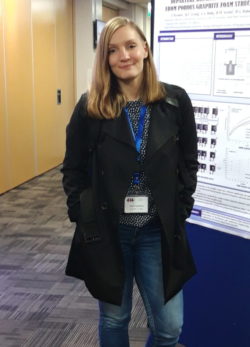
My name is Foteini and I am in my final year of the CDT Fluid Dynamics programme. My academic career started a few years ago at the Department of Chemical Engineering at the Aristotle University in Greece. After my graduation, I had a six-month industrial training at BASELL POLIOLEFINE ITALIA SRL, in Ferrara, Italy. It was there that I first came in contact with Computational Fluid Dynamics (CFD), and developed an interest in this area by observing the importance of CFD in R&D. A few months later, I decided to apply to the CDT at Leeds, considering that this programme will offer me funded study of Fluid Dynamics and the time I needed to learn more about it, before having to decide a specific PhD project. The first year with the embedded Masters degree was an important year for me, considering that my previous academic background was not focused particularly in Fluid Dynamics. Throughout the first year, I had the opportunity to explore the different areas and applications of Fluid Dynamics and make a more informed decision about the PhD project and supervisors I would end up choosing (unlike many other PhD programmes). I found the cohort approach of the CDT very important in the first year of the programme, since learning became much easier by collaborating with students from different backgrounds. The CDT provided me with the opportunity to develop my experimental skills, even as an engineer, I was never experienced with experiments before. More specifically, I had the opportunity to collaborate with a group of biologists at the University of Leeds for the development of an experimental device that can potentially provide them with a cheaper alternative to the expensive existing commercial equipment. The idea behind this device led to me receiving the Margaret Steel Award in 2020! As part of the CDT, I was also given the opportunity to attend and participate in various conferences on Fluid Dynamics, have an Academic Development Internship and work as a Module Assistant/Demonstrator. All of these fantastic opportunities helped me develop my presentation and tutoring skills. As far as the future holds, I expect that having the specialisation and skill set that a PhD in Fluid Dynamics offers will open more opportunities for me to work in R&D.
Yatin Darbar
Year 1
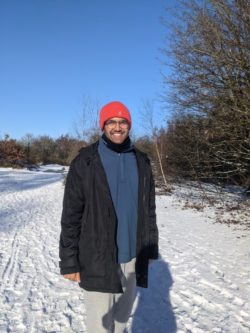
I did not go straight into postgraduate study following completion of my undergraduate studies where I studied for an Integrated Masters in Mathematics at the University of Birmingham. Before joining the CDT, I had a job working in retail. I was a sales colleague, but mostly worked in merchandising various departments of the store for a number of seasonal campaigns. During this period, I also took the time to research all the available opportunities open to me and decide what my next steps were to be.
Coming from such a theoretic background I had little experience of all the different research areas of fluid dynamics and also the computing and experimental methods in research. The CDT has presented me with numerous projects over a variety of fields that combine theoretical, numerical and experimental techniques. From researching PhD projects prior to joining the CDT, I know it is rare to find projects that have such a wide scope for the student to take, but also it is hard to find exactly what topics interest you.
My overall experience of the CDT so far has been good. It has afforded me multiple opportunities to learn more about fluid dynamics, engage with research and learn technical skills. The CDT creates a diverse environment in the sense that many of my cohort have studied different subjects, or have come from different Universities, which means you all have different subject expertise. In our first year, the cohort approach meant we could help one another, since we come from different academic backgrounds. I definitely found this beneficial as I learn better working with peers than just from lecture notes. In the current situation with COVID, we have not been able to collaborate face to face, but we still have found ways around this and the CDT have facilitated things to aid this collaboration.
The CDT has enhanced my technical skills, for example in the first term I learnt how to programme in Python from scratch, use commercial CFD software, post process experimental data and use many other scientific computing packages. My "soft skills" have also improved since I have been working together with my cohort members to develop these technical skills, but also engage with research and having discussions with potential supervisors. My greatest achievement so far is how organized I have been in the first term with managing my deadlines and working efficiently to make sure my work is completed. I have learnt so many new skills from the ground up during the first term, so I am proud I have accomplished so much so quickly.
I am interested in pursuing research when I graduate, in academia or industry. Before joining the CDT programme, I was not able to enter some of the fields I liked because I did not have an engineering background or specialist knowledge of this field. After undertaking a PhD I hope I have the skills and technical knowledge to start a career in research.
Imran Qureshi
Year 2
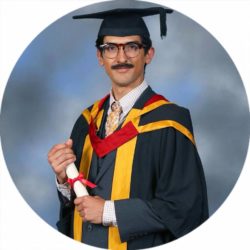
I come from a Mathematics background, which is different to my current PhD research within an Engineering discipline. During my MMath degree, I studied a breadth of mathematical disciplinarians, specialising in fluid dynamics and computational mathematics, which in hindsight gave me a strong academic foundation for further study at Leeds. At that time, the pursuit of fluids was not my primary motivation. I, like most, was unsure of my career path. I chose to pursue higher education as it provided opportunities for academic and industrial exposure, while also improving my career prospects. I then had a career in finance, working as a trainee accountant for a small accountancy firm. I was then promoted to the role of business development executive, but I didn't feel academically challenged or that I was gaining momentum outside of the workplace. As a result, I applied to the CDT is it offered an introductory Masters year where I could develop the skills required to succeed and regaining academic momentum which I felt I had lost outside of an academic environment. My interview at Leeds was the only one in which I felt that my academic journey and professional development was taken into consideration, and I could see that the academic environment at Leeds is stimulating for both academic and personal development. The Masters year on the CDT programme was very engaging and it gave me the opportunity to develop academically such that I could make an informed decision about the direction of my research. I was given ample opportunity to speak with potential supervisors about their respective projects, of which there was an abundance of choice. I decided to pursue an industrially-lead PhD project with BAE Systems, which has enabled me to pursue a career in either industry or academia without limiting my doctoral pursuit.
Megan Bickle
Year 5
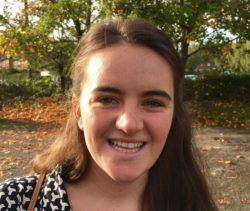
After graduating from my Undergraduate degree in Mathematics and Physics I started working in IT Consultancy. For two years I worked within several different multi-national consumer goods companies. At first I found the challenge exciting especially as I was given a lot of responsibility fairly quickly. However, I began to realise that the prospect of continuing within the field did not inspire much enthusiasm. The CDT was attractive because it provided me the opportunity to refresh my Mathematics skills which I had not used in several years, while also providing an introduction to several fields I had little knowledge of. I was open-minded about what research topic I would choose for my PhD, but from the beginning had an inclination toward atmospheric flows. Being able to explore other options meant when I eventually did choose my PhD, studying mesoscale convective systems, I was confident it was the right choice for me. I found the cohort approach of the CDT most useful at the beginning of the course as we relied on each other's different academic backgrounds to learn new skills. Now in my final year, it often exists as a support system which I can call on. I have found the CDT's focus on soft skills very useful, particularly on how to communicate my research to different audiences and understanding the wider importance of my research. During my PhD the CDT has supported my in applying for a UKRI internship within the Government Department of Environment, Food and Rural Affairs. This was a fantastic experience which gave me a unique insight into how science influences policy decision making!
Khaled Al-Ghaithi
Completed PhD
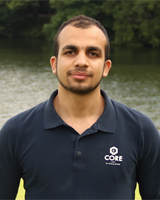
I lived and studied in Yemen until I was awarded a scholarship by Total E&P Yemen to study a BEng Petroleum Engineering degree at the University of Leeds from 2011 until 2015. By mid-2015, the oil and gas industry in Yemen had all but collapsed due to war and the oil price had plummeted greatly; hence, I considered alternative career paths and delayed my return home. My interests were in fluid mechanics so I decided to apply for the CDT programme. The CDT is multidisciplinary, cohort-structured and well organised. The CDT staff come from Engineering, Physical Sciences, Earth and Environment, and other Faculties. The students in my cohort also come from Mathematics, Physics and Engineering backgrounds. I worked with two Mathematicians during my MSc team project and was supervised by Engineering and Mathematics staff who later became my PhD supervisors. My PhD project is on the fluid mechanics of printed electronics, in partnership with Dupont Teijin Films who manufacture substrate polymer film. Throughout my studies on the CDT, I felt at home and was not treated any differently from UK students. My PhD project studies the printing of lines of droplets to form conductive tracks on real substrates that can have topographies. The project is primarily numerical but a printing experimental rig is built and experiments are used for validation, and I have written my first paper which is now under review. The MSc part of the programme was comprehensive involving theoretical, numerical and experimental Fluid Dynamics. This enabled me to undertake my PhD with confidence that I have the relevant background. Throughout the programme, there is also a focus on professional development and soft skills, e.g. attending and presenting seminars, symposiums and conferences, and the programme is also constantly improved in response to student feedback. I also started monthly meetings for researchers interested in a similar area to me which has resulted in collaborations, and information and skills sharing. Overall, it is a well-rounded programme that I would recommend to anyone interested in Fluid dynamics. Following graduation, I plan to continue working in research preferably in an academic context.
Caroline Marshall
Completed PhD
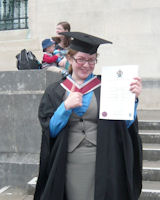
After my Undergraduate degree in Physics, I began working as a secondary science teacher. I knew after my Undergraduate summer internships that I was interested in a research qualification, but hadn't been able to find a project that really appealed. The CDT seemed to be offering the opportunity to apply my existing skills to a really interesting new area. Although I had little experience of Fluid Dynamics specifically prior to joining the CDT, the teaching during the Masters year meant that I was quickly able to get up to speed. The style of the CDT programme was really helpful here. As the cohort came from a variety of backgrounds, we each had different strengths and weaknesses. The collaborative nature of the programme meant that we were able to share those strengths, and rapidly help each other obtain a wide range of skills. This continued throughout the PhD, and even now during writing up we are able to support each other. My PhD uses both CFD and experimental techniques to quantify turbulence in the body of gravity currents. This is a topic I would not have been able to consider without the CDT Masters year. I have had the opportunity to present at several conferences, including two that were international, both times attending with one or more other students from the CDT. This made travelling to America and to a relatively remote area of Italy far less daunting! In addition to research skills, the training sessions provided during the CDT programme covered a wide range of topics such as extended writing and job hunting. This helped me to develop competencies that will serve me well wherever I end up next!
Georgie Williams
Completed PhD
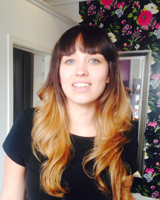
I came onto the CDT programme following a career as a secondary school Mathematics teacher. My Undergraduate degree was in Civil Engineering, so without joining the CDT programme I would not have been able to pursue a PhD another way and having students for such varied backgrounds certainly made it a lot easier. I also felt more confident taking this route as it allowed me to undertake the MSc at the beginning which eased me back into academic life and also provided the training I needed for my PhD. The cohort approach made all the difference to my PhD experience. There are many challenges to completing both an MSc and a PhD, but having plenty of people around going through the same things really helps. The training provided by the CDT and MSc component was beneficial in meeting academics across a range of disciplines and research groups. I have gained so much from the CDT including moral support, friends, and people to bounce ideas off. I have had plenty of opportunities on the CDT programme, including attending conferences in London and Vienna, as well as an overseas placement in Erlangen.
